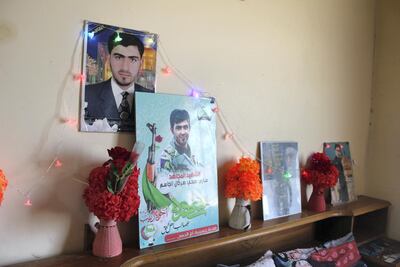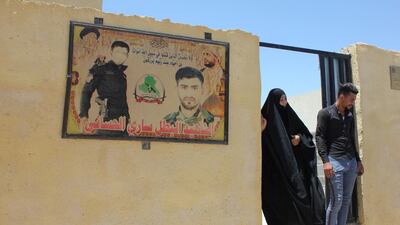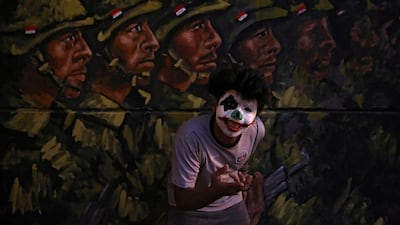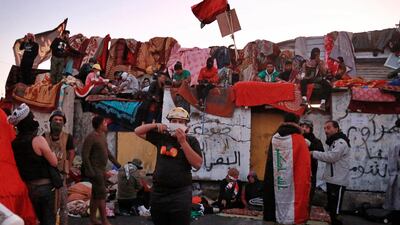Every night, Sahla Al Hasani goes to sleep in a room lined with pictures of her dead son, coloured fairy lights draped around their frames.
“He visits me in my dreams a lot,” she says. “I feel proud of him and all Iraqi martyrs.
“I consider all of them my sons. But I miss him a lot. It is so difficult.”
Her son Sari was 25 when he was killed in June 2015 in Iraq’s Saladin province, during the campaign to remove ISIS.
He belonged to Asaib Ahl Al Haq – the League of the Righteous.
It is one of about 60 units in the Popular Mobilisation Forces, an umbrella group of mostly Shiite paramilitaries.
Since Sari’s death, Asaib has paid for a new house for his family, a $10,000 (Dh36,700) pilgrimage to Makkah for Sahla, and has promised to cover his relatives’ healthcare costs.
It also covered the 5 million Iraqi dinar (Dh15,500) cost of his three-day funeral wake, after which he was buried in a plot owned by the unit in Wadi Al Salam, the cemetery for Shiites in Najaf.
It is all part of the benefits package the Iran-aligned militant group offers the families of dead fighters. It lost scores of men in anti-ISIS operations, in which the PMF as a whole played a major role.

The Al Hasanis are from Abu Al Khaseeb, a poor town south of Basra city of rough breezeblock buildings, where provision of state services like electricity and paved roads is patchy at best.
Inside their new Asaib-provided home, clean blue and brown tiles line the walls, plastic reed carpets cover the floor and a ceiling fan beats back the sticky heat.
A plaque on the outside wall has Asaib’s logo next to Sari’s death date.
“Our old house was in a poor state – this one is much better.
“There is water and electricity,” said Sari’s brother Zulfiqar, 23.
The housing campaign was officially launched in January, with a promise from Asaib’s leader Qais Al Khazali to build or repair “a house for the family of every martyr”.
Including the Al Hasanis, the group has so far provided new homes to five Basrawi families, at a cost of 30 million to 40 million dinars each.
It intends to provide for five more still living in rented accommodation.
Funding comes from Asaib’s budget as well as private donations, according to a member of the group’s martyrs’ committee in Basra.
“Our role is to build houses, provide social support and health care, as well as provide jobs to the martyrs’ relatives,” said the committee member, Abu Maryam.
Sari’s unemployed brother Zulfiqar said Asaib was helping him to secure work at Iraq’s state oil company.
Backed by Iran, Asaib formed in 2006 as a splinter group from cleric Moqtada Al Sadr’s Mahdi Army.
It claimed thousands of attacks on US troops in Iraq, and kidnapped and killed Iraqis, Britons and Americans.
It also sent fighters to back the Assad regime in Syria.
It has since tried to rebrand itself as a nationalist political party: it controls two ministries and has 15 MPs in the Iraqi parliament.
It has developed a wide network of youth associations, social services and women’s representatives.
That welfare system mirrors those of other Iran-aligned groups in the Middle East.
In Lebanon, despite a failing economy and US sanctions, the Iranian proxy Hezbollah provides housing, health care and education for the families of its dead and injured fighters.
In Iraq, not all PMF units are aligned with Iran. But as the fight against ISIS has wound down, analysts say those who do side with Tehran have been using service provision to push for incremental social change.
“This is another way of them saying, stability also comes from us – we are always fighting ... but you’re living a better life, a more just life, and you’re getting services and other fun stuff that you need,” said Phillip Smyth, a researcher on Shiite militant groups at The Washington Institute for Near East Policy.
“That’s a big facet to it.”
Yet not everyone is happy with Asaib and similar groups’ activities, especially their responses to the anti-government protests that have swept across southern Iraq for the past two months.
An activist from Basra fled Iraq last week after discovering that his name was on a wanted list drawn up by local political parties and the intelligence services.
“I fled in secret to the airport and I booked the next plane I could,” he told The National from a nearby country.
The activist’s family escaped from Iraq years ago after receiving threats from Asaib over business links with American contractors. He returned to Basra, but last year started receiving direct threats again on social media, through telephone calls and in person.
“We have been subjected to a lot of harassment, plus direct and indirect threats because of activities that they don’t like, like charitable activities and cultural festivals,” the activist said. “An example of a threat is, ‘Shut up, otherwise we’ll make you shut up in our own special way’.”
It is difficult to pinpoint exactly which party was sending the threats, he said, as all use similar intimidation techniques. But along with another Shiite group, Asaib “is the most active” in threatening people in Basra who oppose its activities, he said.
His account was supported by four other activists and analysts interviewed by The National.
Although protesters have publicly beaten pictures of top Iranian leaders, they appear reluctant to speak out against their Iraqi partners.
“Everyone is scared because of Asaib Ahl Al Haq,” said another Iraqi activist.
“They are highly trained killers. They had lots of equipment, even before they went into politics, and they are more powerful now. Whenever I asked in our networks to speak to a journalist about them, they replied: ‘Are you crazy? We don’t want our voice to be heard.’ They get scared.”
Asaib’s offices have been attacked by protesters who blame them – and other political parties – for rampant corruption. Last month, a group attacked and killed a local leader, Wissam Al Allawi, although it is not known if he was singled out specifically.
Like the Iraqi army and anti-riot police, Asaib responded to protesters with force.
Seven protesters were killed last month when a gunman shot at them in Nasiriyah, a city between Basra and Baghdad, according to a witness.
Another estimate put the death toll at five.
“There were a number of people who were going out to protest and someone opened fire on them from the Asaib Ahl Al Haq headquarters,” the witness said. “The party members then drove around the streets, opening fire. The authorities didn’t intervene until the protesters started to set fire to the Asaib HQ.”
A verified video clip from the city of Amara, 70 kilometres from the Iranian border, showed another gunman shooting at protesters from a building bearing Asaib’s logo.
Al Khazali has said that he supports protesters’ demands for better government, but claimed demonstrations have been infiltrated by “foreign parties”, including Israel and the US.
They want to cause “chaos and internal disorder” in Iraq, he said.
Asaib’s spokesman denied the group had threatened people.
He told The National that any retaliation for the death of Al Allawi, the local leader, would be through legal means.
Analysts say the militant group and other Iran-aligned PMF brigades may take after Tehran when it comes to cracking down on dissent, using strategies of plausible deniability.
They will probably use a combination of “discreet violence and media manipulation” to “absorb some public anger and undermine the protest movement”, said Nathaniel Rabkin, managing editor of Inside Iraqi Politics, a political risk newsletter.
“I suspect that’s in part because they know that’s how Iran deals with these things.
“When there are protests in Iran, the government is able to figure out: who are the people we need to isolate; who are the people we need to target; who can be intimidated; who cannot; and how long should we let it go on? I think that’s probably how they’re looking at this.”
Another Iraqi with knowledge of Asaib said that the group threatened people who disagreed with their vision of ruling Iraq.
“They are against a civil state in Iraq – they want a Wilayat Al Faqih,” the source said, referring to the system of government applied in Iran under supreme leader Ayatollah Ali Khamenei.
Many Shiites do not believe in this form of leadership.
The activist who fled Basra is determined to return home, but does not know when it will be safe to do so.
“I am not the type to be scared,” he said. “I will disappear until the arrest warrant is dropped.
“I don’t know how long that will be. It could be two weeks or two months. I don’t know.”












